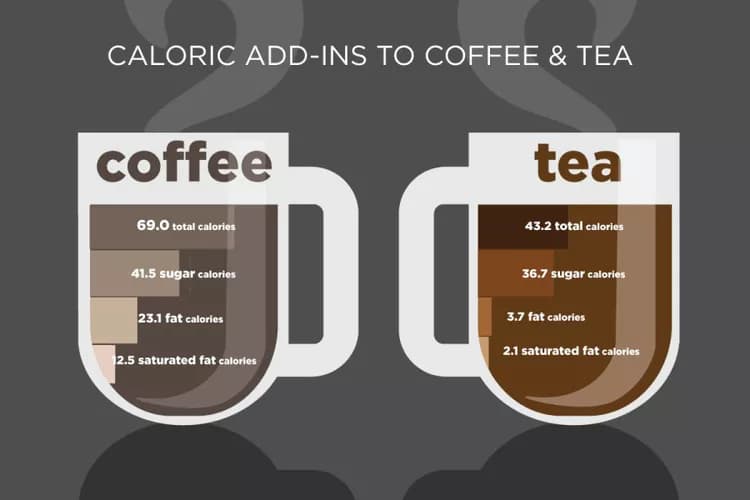
Study Tallies Extra Calories Americans Consume In Their Coffee, Tea
More than 160 million people in the U.S. drink coffee or tea on a regular basis, and many of them use sugar, cream, flavored syrups or other calorie-laden additives in their drinks of choice. A new analysis reveals just how much Americans are adding to their caloric intake by spicing up or sweetening their coffee or tea.
The research looked at 12 years of data (ending in 2012) from the National Health and Nutrition Examination Survey, including information from a nationally representative sample of 13,185 adults who reported drinking coffee and 6,215 adults who reported drinking tea in the 24 hours prior to being surveyed.
The data suggest that more than 51 percent of U.S. adults drink coffee and nearly 26 percent drink tea on any given day, said University of Illinois kinesiology and community health professor Ruopeng An, who conducted the study. Roughly two-thirds of the coffee drinkers and one-third of the tea drinkers put sugar, cream, flavorings or other calorie-rich additives in their drinks, he found.
"Many people prefer drinking coffee and tea with sugar, cream, half-and-half or honey," An said. "These add-in items are often dense in energy and fat but low in nutritional value."
Milk products add a bit of calcium to the diet, but the amount -- 22 milligrams per day, on average -- is negligible, An said. The daily recommended calcium intake is 1,000 to 1,300 milligrams, depending on one's age and pregnancy status.
Those who drink their coffee black consume about 69 fewer total calories per day, on average, than those who add sweeteners, cream or other substances to their coffee, An found. More than 60 percent of those calories come from sugar, with fat accounting for most of the rest of the extra calories consumed.
Tea drinkers tend to add fewer calorie-dense substances to their tea if they add anything at all, the analysis found.
"Compared with adding nothing to one's tea, drinking tea with caloric add-ins increased daily caloric intake by more than 43 calories, on average, with nearly 85 percent of those added calories coming from sugar," An said.
The daily intakes may seem small, but the extra calories every day can add up to extra pounds, An said.
"Our findings indicate that a lot of coffee and tea drinkers regularly use caloric add-ins to improve the flavor of their beverages, but possibly without fully realizing or taking into consideration its caloric and nutritional implications," he said.
Materials provided by University of Illinois at Urbana-Champaign. Original written by Diana Yates. Note: Content may be edited for style and length.
Disclaimer: DoveMed is not responsible for the accuracy of the adapted version of news releases posted to DoveMed by contributing universities and institutions.
Primary Resource:
An, R., & Shi, Y. (2017). Consumption of coffee and tea with add-ins in relation to daily energy, sugar, and fat intake in US adults, 2001–2012. Public Health, 146, 1-3. DOI: 10.1016/j.puhe.2016.12.032
Related Articles
Test Your Knowledge
Asked by users
Related Centers
Related Specialties
Related Physicians
Related Procedures
Related Resources
Join DoveHubs
and connect with fellow professionals

0 Comments
Please log in to post a comment.